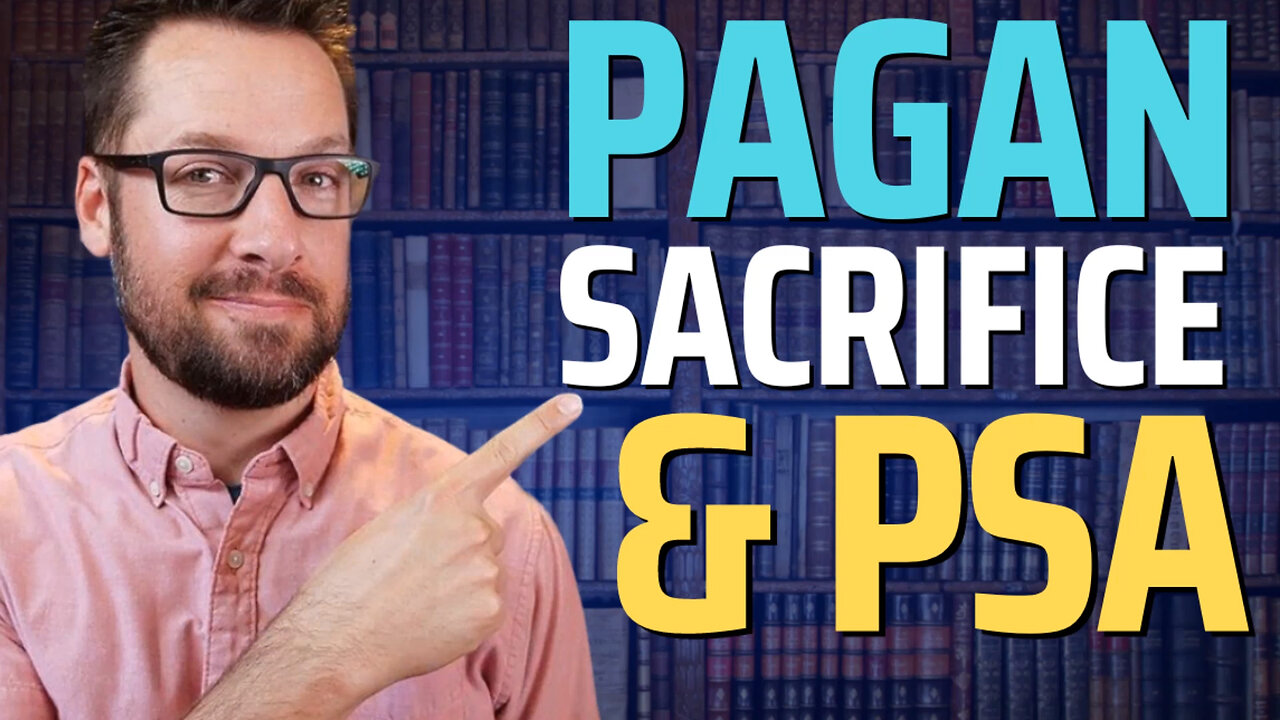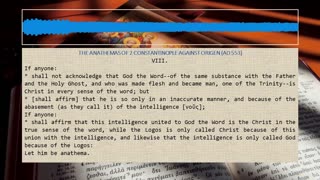Premium Only Content

Mike Winger Critique Episode 9: Is PSA Pagan Mythology?
Mike Winger vehemently denies that penal-substitutionary atonement (PSA) resembles the human sacrifices of pagan religions. Sadly for him, his elders in the atonement school freely admit the parallels. John MacArthur defines “propitiation” as a sacrifice to appease an offended deity, precisely the same definition found in ancient paganism. Today’s video also features audio clips of apologist Josh McDowell, systematic theologian Wayne Grudem, and seminary professor Warren A Gage admitting PSA’s pagan parallels.
These admissions notwithstanding, atonement schoolers dismiss as liberal any critic pointing out the same parallels. John MacArthur's statement that liberal theologians despise the concept of propitiation is called out as a fallacy, as it assumes the truth of MacArthur's postulate and dismisses critics as lacking understanding or commitment to the Bible. MacArthur's use of the term "biblical doctrine of atonement" is both a tautological-question fallacy and a slap at critics. Furthermore, MacArthur misrepresents Anselm's approach to the atonement, as Anselm did not quote the Bible in his work on the atonement, but instead used deductions inferred from accepted premises.
Analogies used to mock PSA also set atonement schoolers in high dudgeon. Winger indignantly condemns the virgin-and-the-volcano analogy and any comparison of PSA to child sacrifice. However, Paul Vendredi counters that the essential similarities between the volcano analogy and PSA outweigh the differences, as both involve an innocent person sacrificed to appease an angry deity. He also notes that Anselm, the creator of PSA, referred to Christ as the "child of God," making the comparison to child sacrifice valid. PSA proponents like Wayne Grudem hold contradictory positions regarding emulating God's behavior. While Grudem acknowledges that Christians are supposed to follow God's example, he also warns against interpreting PSA as justification for child abuse. Paul finds it odd that Grudem, after describing PSA, feels the need to caution against such behavior. Paul also compares the Aztec god Tlaloc, who preferred child sacrifices, to the god envisioned in PSA.
Paul then discusses sacrifice in ancient civilizations, focusing on the Moabites, Romans, and Carthaginians. Paul notes that when pagans feel worshipful, they offer animal sacrifices, but when they are frightened, they escalate to human sacrifices. The Romans, who are often romanticized for their contributions to civilization, also engaged in human sacrifice during times of fear and desperation, as seen in the First and Second Punic Wars. Paul cautions Christians not to look down on ancient pagan civilizations while overlooking the similarities between their practices and those of more celebrated civilizations like the Romans.
Paul also critiques Winger’s endorsement of legal fictions, which are a hallmark of Greco-Roman religion. In ancient Greek and Roman practice, animals had to be “willing” to be sacrificed, and this willingness was determined through a legal fiction called the "comedy of innocence."
Host Warren McGrew expresses concern over the idolatrous attachment PSA’s exponents show to the doctrine's chief advocates, such as R.C. Sproul, John MacArthur, and Paul Washer. That idolatry is itself pagan in nature.
-
 1:37
1:37
Paul Vendredi
3 months ago2 Constantinople - Anathemas 8-9
141 -
 4:53:38
4:53:38
Due Dissidence
13 hours agoTaibbi DEFENDS Weiss-CBS Deal, Pakman Producer SPILLS TEA, Massie CALLS OUT Trump Informant Claims
23.2K34 -
 2:33:47
2:33:47
TheSaltyCracker
6 hours agoMedia Silent on Metro Attack ReeEEStream 9-07-25
135K247 -
 56:27
56:27
Sarah Westall
7 hours agoEnd of Aging, Hydrogen Bomb Research, Serial Killers & Violent Behavior, Bipolar Research w/Dr Walsh
33.6K5 -
 4:36:53
4:36:53
MattMorseTV
8 hours ago $12.54 earned🔴Sunday Gaming🔴
63.3K5 -
 2:31:16
2:31:16
Joker Effect
5 hours agoINTERVIEWING Rumble Gaming community members: Viewbotting and how they see the current landscape.
24.5K3 -
 1:45:53
1:45:53
Nerdrotic
8 hours ago $12.71 earnedUnravelling the Secrets of Skinwalker Ranch | Forbidden Frontier #115
88.4K6 -
 41:56
41:56
Athlete & Artist Show
8 hours ago $1.31 earnedAustin Ekeler: Going From "0 Star Recruit" To Leading The NFL In TD's, New Fan App | FROM THE VAULT
31.9K1 -
 2:46:49
2:46:49
Barry Cunningham
13 hours agoNOW THEY FEAR US! | RFKJR STRIKES BACK | JD VANCE ON PRESIDENT TRUMP | AND MORE NEWS!
74.7K55 -

Spartan
8 hours agoCharlotte Qualifier watch party + Ranked and Expedition 33
35.2K1